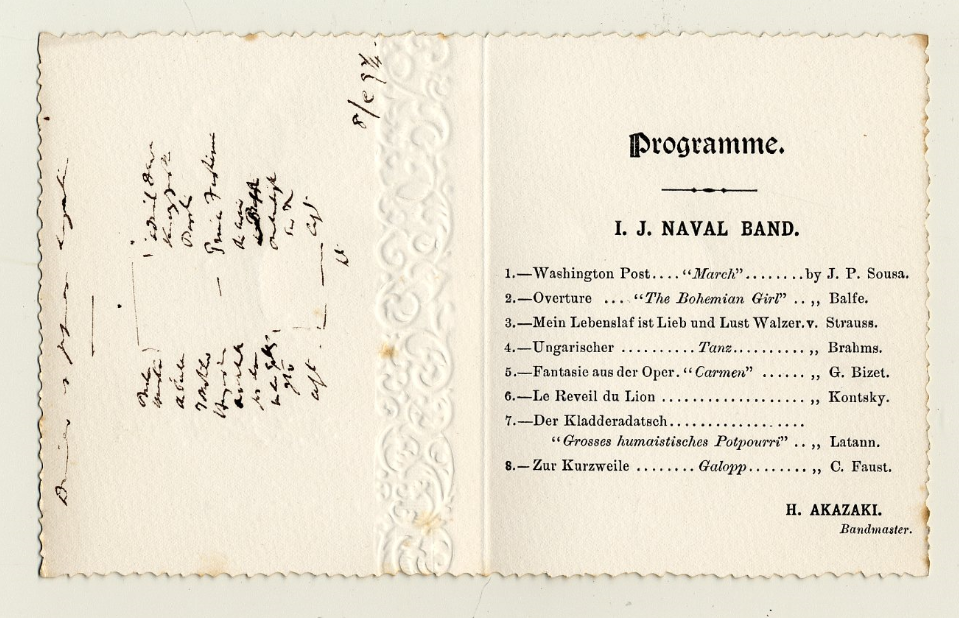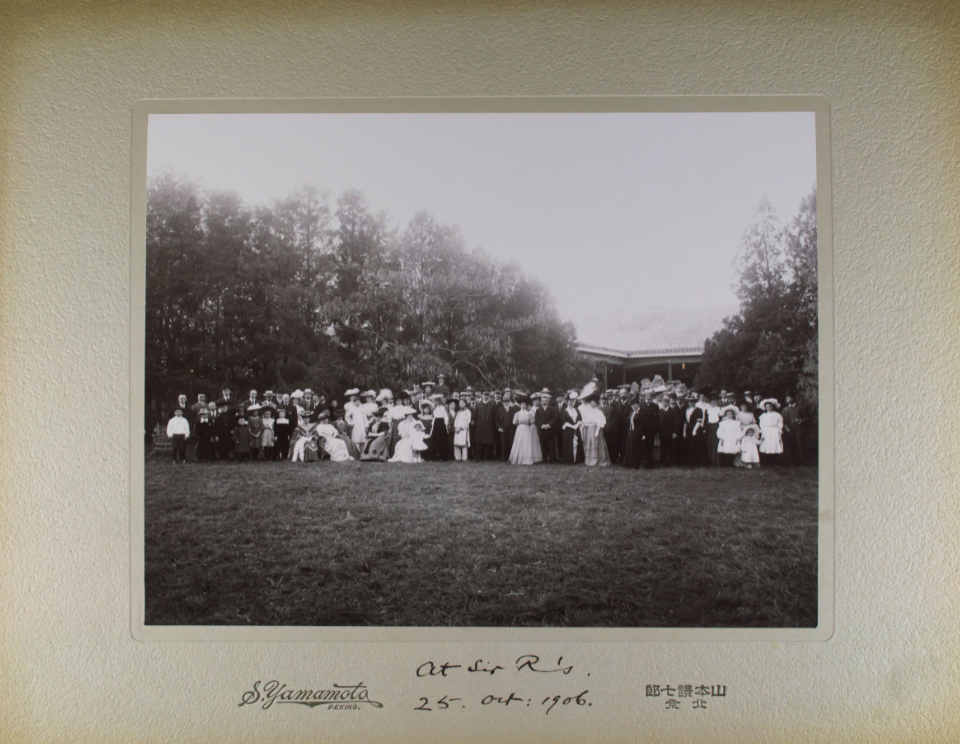Hart’s Music Programmes
Researcher, Keith Robinson has written this blog on the music programme’s of Sir Robert Hart.
Hart’s Music Programmes Online
There are many Brass Bands in England that still have the actual music libraries from when they were formed, however the types of programmes they played have received less attention and few have survived because they played concerts when hired to do so and often in the open air. Hart’s band does not have the music library, but it does have these programmes and although they are only from a limited time period they can provide useful information about which dances were popular.
In a letter[1] to Campbell dated 19th October 1890, he says he is starting to teach some of the boys from the Brass Band how to play string instruments with the intention of forming a String Quartet, purely for his own enjoyment. It is clear from the list of Band Boys in 1906 that nearly all members of the band played two instruments. In Letter 1147[2] dated 22 October 1899 he comments: “My band is now not only Brass but String. We danced the other night to the music of the latter, and it was in perfect tune and perfect time. Truly these fellows can learn anything!”
The dance styles show they were still dancing many older dance styles.
From the Baroque: the Gavotte and Minuet.
From 1810: the Quadrille became popular. A revival of the Cotillian.
From 1820: the Lancers.
From 1830: the Gallopade and Mazurka.
From 1840: the Polka and the Shottische (very popular with Victoria).
But also the latest dance crazes such as:
From 1890: the Cake-Walk.
From 1900: the Two Step.
Indeed what is striking is how few examples there are of Bach, Handle, Mozart and how predominantly contemporary composers feature in these programmes. In 1902 they are playing Falstaff (Verdi performed 1893); In 1903 A Gaiety Girl (Jones performed 1893). Where are the equivalent modern Brass Band selections today of “Written on Skin” (George Benjamin performed 2013) or “The Exterminating Angel” (Thomas Adès performed 2016)?
Images from left to right: Music programme MS 15/1/38/155a; Robert Hart Diary entry MS 15/1/38/156; Members of Girls Literary Club MS 15/6/9/034



Some of the programmes are of what one would assume were private concerts. The 17th March 1891 is particularly interesting because Hart describes it as the Girls Literary club[3]. According to his diary entry they met from 15.30-18.30, on Tuesday the 17th March. He said he had a very enjoyable afternoon!
1. Music by Dora or Grace
2. Music by Leonora
3. Comp. “ Dora
4. Poetry “ Elsa
5. Music “ Dora
6. Comp: “ Edith[4]
7. Poetry “ Lucy
8. Poetry “ Grace
9. Poetry “ Sir Robert
10. Poetry “ Garvin
11. Poetry “ Nellie
12. Poetry “ Mabel
13. Comp. “ Lucy
14. Poetry “ Edith
15. Music “ Sir Robert and Dora.
So first of all who were these girls? Dora, Elsa, Lucy and Kathleen were the Drew family, and we know Mrs Drew was there as well. Edward Bangs Drew, her husband and father of the girls, joined the Chinese Maritime Customs Service in 1864 after earning a degree from Harvard. In 1868, he was appointed a commissioner of the service, a position he held for decades.
Grace and Mabel Lowry. Mabel Lowry born 24 Nov 1882, Beijing, China; died 14 Aug 1969, California. Grace Lowry born 26 Nov 1876 Ohio, died 28 Sept 1973, Florida[5]. Their father was Rev Dr Hiram Harrison Lowry (1843-1924); mother Parthenia Elizabeth Nicholson (1838-1919). Rev Dr Lowry was very involved in the North China Mission and became president of Huiwen University (later Yenching University)[6].
Nellie and Leonora Pilcher, were the daughters of Rev Leander William Pilcher (1848-1893) and Mary Garwood (1852-1926). Rev Pilcher was a missionary in China, and he went on to become the first president of Peking University. Rev Pilcher and Rev Lowry were classmates at Ohio Wesleyan University[7]. Leonora was born in China Nov 1881 and she had an older sister Ellen (Nellie ?) born July 1879 who was also born in China.[8]
Garvin Denby, b. 1877, 11 August in Evansville, was the son of Charles Denby, US Minister to China 1885-1898[9].
So we know at this time Mabel was 9 years old, Grace 15 years old, Leonora 10 years old, Nellie 12 years old, Garvin was 14 years old, Dora was 14 years old, Lucy was 7 years old, Kathleen was 4 years old, and Elsa was 10 years old. What is charming about this is it is yet another example from many that we know of, where we see the workaholic Hart going to extraordinary lengths to spend time and encourage young people in their musical and artistic endeavours.
It is easy to have an image of China at this time as being isolated from the rest of the world. A place where transport and communication was difficult and as a result you expect them to be out of touch with what was happening in Europe and America, but the programmes give another picture.
29th April 1897 Programme was “Given under the high patronage of His Excellency Mr. Baron De Vinck De Deux-Orp, Minister of Belgium and Mr. Pawlow, Russian Chargé d’Affaires, by Mr Henry Merck, Cellist, ex-Professor at the Helsingfors Conservatory, and cello solo from the Royal Theatre in Brussels.”
What follows is a totally unexpected concert of chamber music in which Henry Merck is joined by Encarnaçaô and Van Aalst and others.
The French Army 16th Regimental Band under their conductor perform on 8th June 1902 and start their programme with what looks like a World Premiere of a work by their conductor Degaye. “Entry of the French in Beijing”.
In 1905 the German Navy Band from S.M.S. Fürst Bismarck give a concert and chose to include a work by Charles Louis Ambroise Thomas who was related to Charlotte Devéria ( 1856- 1885) who lived in Beijing for a short while. In 1906 the Japanese I.J. Naval Band performed, and their programme of 15 October included music by Balfe and of 16 October, the famous Scottish trumpet virtuoso Matthew Arbuckle (1828 – 1883).
Apart from the international aspect of these concerts they also give a sense of just how politically important Hart was that they included an invitation to him.
[1] Letter 774: The IG in Peking : letters of Robert Hart, Chinese Maritime Customs, 1868-1907 / edited by John King Fairbank, Katharine Frost Bruner, Elizabeth MacLeod Matheson ; with an introduction by L.K. Little Belknap Press of Harvard University Press, 1975
[2] Ibid.
[3] Hart Diary Volume 38 MS 15/1/38/156
[4] Possibly Edith Wherry (1876-1961), daughter of missionaries in China at this time http://archiveswest.orbiscascade.org/ark:/80444/xv20214
[5] 1900 United States Federal Census (accessed 12 May 2020)
[6] The United States in Asia: A Historical Dictionary by David Shavit. Greenwood Publishing Group, 1990, p. 310
[7] A memorial of Leander William Pilcher … lovingly inscribed by his brother Lewis S. Pilcher. Privately printed, 1895 (accessed 12 May 2020), p. 7
[8] 1900 United States Federal Census (accessed 12 May 2020)
[9] The Diamond of Psi Upsilon, Volume 20, Issue 1. Psi Upsilon Fraternity, 1933, p. 42





Fantastic web site. Lots of helpful information here. I’m
sending it to some buddies ans additionally sharing in delicious.
And naturally, thanks in your effort!